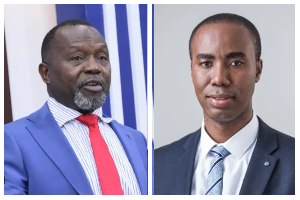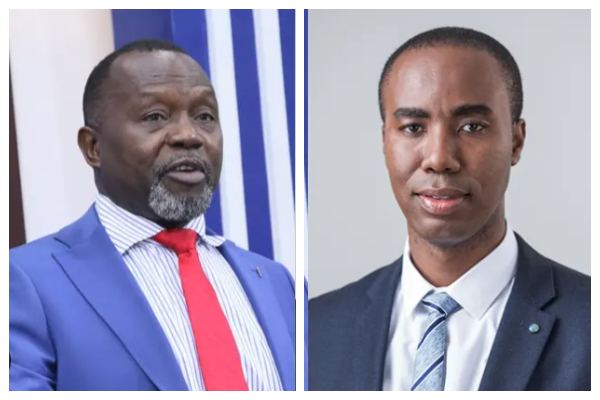 A photo of Dr Dominic Ayine and Kwabena Adu-Boahene
A photo of Dr Dominic Ayine and Kwabena Adu-Boahene
In a dramatic courtroom development, the Attorney-General and Minister for Justice, Dr. Dominic Ayine, has submitted classified bank records from the Akufo-Addo administration’s National Security Secretariat as part of an ongoing criminal trial—while hesitating to release similar records from the Mahama era, citing national interest concerns.
The disclosures were made in the high-profile case of The Republic vs. Kwabena Adu-Boahene, where the former Director-General of the National Signals Bureau (NSB) faces charges of financial misconduct.
The NSB, previously known as the Bureau of National Communications, operates under Ghana’s National Security Council.
The documents tendered include detailed bank statements and international transfer records from what the prosecution described as the “Government BNC account”—a suspected special operations account allegedly used for covert transactions.
These records, submitted without redaction, have drawn widespread attention in legal and security circles due to revelations of multi-million-dollar dealings between Ghana’s National Security outfit and foreign intelligence and cyber-defense contractors, including firms based in Israel.
Notably, some transactions were said to have been approved or supervised by the late National Security Coordinator, Joshua Kyeremeh, the accused, Kwabena Adu-Boahene, and other senior officials.
Edith Opokua Adumuah, former Director of Finance at the Secretariat and now a prosecution witness, is also prominently mentioned in the filings.
During a Case Management Conference held on Thursday, June 26, lead defence counsel Samuel Atta Akyea pushed back strongly against what he described as the Attorney-General’s “selective disclosure of evidence.”
In a motion backed by an affidavit, he asked the court to compel the state to release all financial records from National Security’s special operations accounts, spanning every government in Ghana’s Fourth Republic since 1992.
“The Attorney-General has unreservedly filed National Security’s special operations accounts from the Akufo-Addo presidency before the whole world,” Akyea told the court.
“We cannot accept cherry-picking. The prosecution is duty-bound to disclose all material uncovered during investigations—not just what supports their case.”
Akyea argued that the requested disclosures could reveal operational precedents or patterns that might exonerate his client or provide crucial context for his actions.
Responding on behalf of the Attorney-General’s office, Deputy A-G Justice Srem Sai rejected the defence’s call for historic disclosures as “overly broad and irrelevant” to the specific charges facing Adu-Boahene.
“The request is not only impractical but also borders on compromising national security,” Sai contended. “The current charges are linked to specific financial transactions during a defined period under one administration.”
The Deputy A-G insisted that the prosecution has complied fully with its disclosure obligations relating to the charges and accused the defence of attempting to turn the trial into a political inquisition.
The court is expected to rule on the defence’s motion for further disclosures on Thursday, July 3, 2025. Until then, whether records from the Mahama era and potentially even earlier administrations will be released remains unresolved.
Meanwhile, Kwabena Adu-Boahene maintains his innocence and has denied any wrongdoing. Observers say the case could set significant precedents regarding transparency, accountability, and evidentiary disclosure in prosecutions involving national security finances.
AM/KA
GhanaWeb Special: The gold market that fuels galamsey


